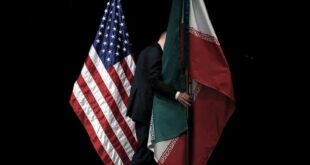 VIENNA (Reuters) — Non-aligned states will back Iran’s right to nuclear fuel production at a UN meeting this week, unmoved by US calls to join efforts to get Tehran to stop enriching uranium, diplomats said.
VIENNA (Reuters) — Non-aligned states will back Iran’s right to nuclear fuel production at a UN meeting this week, unmoved by US calls to join efforts to get Tehran to stop enriching uranium, diplomats said.
UN Security Council powers are waiting for Iran to respond to an offer they made last week for incentives if Tehran suspends enrichment and penalties if it does not.
Russian Foreign Minister Sergei Lavrov was quoted as saying on Tuesday that Tehran will “soon” give its response.
Washington has nudged Non-Aligned Movement (NAM) states to endorse the package at a session of the International Atomic Energy Agency (IAEA)Â governing board meeting in Vienna this week.
It had hoped support by the 15 NAM nations on the 35-member IAEA board would help Washington and the European Union deflect Iranian assertions it is being bullied by powerful countries bent on denying the Islamic state nuclear energy.
But diplomats from the NAM, which groups 114 nations, said it would reissue a declaration made by its foreign ministers in Malaysia on May 30 backing Iran’s right to nuclear technology.
“We won’t make a new statement referring to the current [big power] proposal or make supportive noises in this regard,” said a NAM diplomat, speaking on condition of anonymity.
“NAM does not want to pronounce on a proposal that basically no one knows full details about,” the diplomat added.
Iran says its atomic drive is meant to generate electricity.
The West, noting Iran has the world’s second largest reserves of oil and gas, suspects Tehran is concealing an atom bomb project since it hid enrichment research from the IAEA for almost 20 years and has called for Israel’s destruction.
Elements of the package of trade and technology sweeteners offered to Iran by the five permanent members of the UN Security Council and Germany have been leaked by diplomats. They include unspecified penalties should Iran rebuff the offer.
Diplomacy not confrontation?
Gregory Schulte, US envoy to the IAEA, told Reuters he still expected NAM states “with few exceptions” would urge Iran to “choose the path of diplomacy rather than confrontation.”
“My consultations with other board members make clear that countries from every region and grouping are concerned with Iran’s failure to build international confidence,” he said.
NAM countries are worried that making Iran abandon its nuclear fuel enrichment plans would set a precedent preventing other developing states pursuing an atomic energy option.
They oppose any resort to sanctions as mooted by the West, seeing no justification so long as Iran has not been proved to be using enrichment technology to build atom bombs in violation of the nuclear Non-Proliferation Treaty.
An IAEA board vote on   February 4 to refer Iran to the Security council was joined by a narrow majority of NAM members after heavy Western lobbying.
But two influential non-aligned giants, South Africa and Indonesia, abstained, demonstrating continued misgivings in the developing world about singling out Iran.
US State Department spokesman Sean McCormack said on Tuesday: “We are confident that the world will mobilise and urge Iran to come to the table to resolve these differences via diplomacy.” Tensions also resurfaced among the six powers which wrapped up the Iran package on June 1 after weeks of difficult talks.
Russia and China, which had insisted the Iran offer play down references to possible sanctions, at first refused a French proposal to have the group, in a joint statement to the board, push Iran to embrace the package, an EU diplomat said.
“They want to maintain ambiguity…, not look one-sided. Their trade interests are a factor,” he said, alluding to heavy Russian and Chinese stakes in Iran’s energy industry.
But two other Western diplomats in the group said later Russia and China had agreed to a letter to the board simply reiterating the June 1 pact and signed by Britain’s IAEA envoy.
“The differences were more procedural than substantive. This statement has the full agreement of all six. Reports of a big split among us are wrong,” one of the two diplomats said.
The IAEA board was to take stock of the dispute in debate on Thursday. A series of statements was likely but no resolutions. Š
 Eurasia Press & News
Eurasia Press & News


